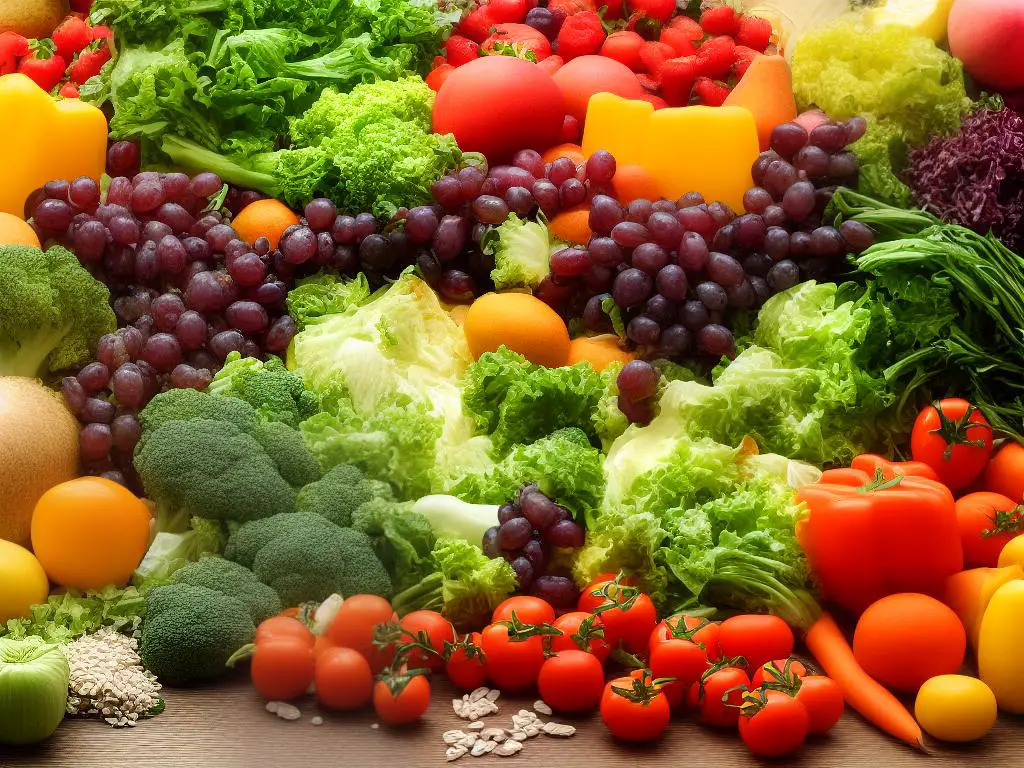As a pig owner or enthusiast, understanding their dietary needs and preferences is crucial for maintaining their health and well-being. In this article, we will explore the pig’s natural diet, the nutritional value and potential risks of crab apples, as well as the benefits and drawbacks of including crab apples in a pig’s diet. Additionally, we will discuss alternative fruits and foods that can be included in a pig’s diet for optimal nutrition.
The pig’s natural diet
Pigs, both wild and domesticated, are omnivorous animals with a diverse diet. In the wild, pigs are known to consume a variety of food sources, including roots, tubers, fruits, nuts, and small animals such as insects and even small vertebrates. Domestic pigs are fed a balanced diet consisting of grains, vegetables, and protein sources, such as soybean meal, to meet their nutritional needs. Pigs are also known to be opportunistic eaters and can consume a wide range of edible items when given the chance.
Crab apples, being a type of fruit, are within the natural dietary range of pigs and can be consumed by them. As a relatively small, hard, and tart fruit, crab apples provide a source of dietary fiber, vitamins, and minerals for pigs. However, it is important to note that they should be considered as a supplementary treat and not as a primary food source for pigs, as they may not be able to fulfill their complete nutritional needs.
Pigs are known for having varied tastes in food, and as omnivores, they can eat a wide range of fruits and vegetables. They tend to favor sweet and juicy fruits over hard and sour ones, like crab apples. This doesn’t mean that pigs cannot eat crab apples, but rather that they might be more selective about consuming them. Providing a variety of fruits and vegetables, including crab apples, along with their regular diet, can help ensure that pigs have access to a wide range of nutrients and are less likely to suffer from nutritional deficiencies. Moderation should be considered when offering treats such as crab apples to avoid potential health issues related to overconsumption.

Crab apples – nutritional value and potential risks
Crab apples, the smaller and more tart relatives of the common apple, are found in various regions across the United States and can be a good source of nutrition for pigs. They are packed with vitamins and minerals such as vitamin C, potassium, and fiber. The natural sugars in crab apples can provide a quick source of energy for pigs while satisfying their sweet cravings. However, there are potential risks associated with feeding crab apples to pigs. Small crab apples might pose a choking hazard to pigs, especially if they try to swallow them whole. To mitigate this risk, cut the crab apples into smaller pieces before feeding them to the pigs. Another potential issue is that the seeds found in crab apples contain amygdalin, a compound that breaks down into cyanide when ingested. Consuming large amounts of these seeds can lead to cyanide poisoning, which can be lethal for pigs. To ensure the safety and well-being of pigs while feeding them crab apples, remove the seeds and cut the fruit into smaller, manageable pieces. By taking these precautions, the risk of choking and cyanide poisoning can be minimized, allowing pigs to enjoy the nutritional benefits of crab apples without putting their health at risk. As with any food, moderation is key, so be sure to include a variety of fruits and vegetables in the pigs’ diet, along with their regular feed, to provide them with a well-rounded and balanced diet.

Benefits of crab apples for pigs
Crab apples are a potential food source for pigs, containing essential nutrients that contribute to their overall health. These small fruits, sometimes tart in taste, are full of vitamins and minerals, such as vitamin C, potassium, and dietary fiber, which can be beneficial to the digestive system of pigs. Additionally, crab apples have natural antioxidant properties that help enhance the immune system and promote overall wellness in pigs.
While there is limited research specifically focused on the benefits of crab apples for pigs, it is widely accepted that a varied diet, including fruits and vegetables, is advantageous for them. Anecdotal evidence from experienced pig owners suggests that pigs enjoy eating crab apples, and incorporating these fruits into their diet can be a valuable addition. However, it is important to feed apples in moderation to ensure a balanced diet and prevent any adverse effects from overconsumption.
Some experts recommend monitoring the quantity of crab apples fed to pigs, especially if they have access to these fruits in their natural habitat, where they might overindulge. Pigs should always have access to fresh water, as consuming large quantities of fruit can lead to the risk of dehydration. As long as pigs are provided with a balanced diet and introduced to new food items gradually, crab apples can be a healthy and satisfying addition to their dietary repertoire.
Drawbacks and precautions when feeding pigs crab apples
When it comes to feeding pigs crab apples, it’s essential to consider potential health risks and exercise caution. One concern is the seeds of the crab apples, which contain small amounts of cyanide. While the pigs would need to consume large quantities of the seeds to experience any cyanide poisoning, it’s still important to be aware of the potential risk. To avoid this issue, it’s recommended to remove the cores and seeds before offering the crab apples to pigs.
Some experts recommend monitoring the quantity of crab apples fed to pigs, especially if they have access to these fruits in their natural habitat, where they might overindulge. Pigs should always have access to fresh water, as consuming large quantities of fruit can lead to the risk of dehydration. As long as pigs are provided with a balanced diet and introduced to new food items gradually, crab apples can be a healthy and satisfying addition to their dietary repertoire.
As with any new food introduction, moderation is key when feeding pigs crab apples. Pigs have a diverse diet, and while they can consume a variety of foods, incorporating new items should always be done in smaller quantities to test for any adverse reactions. Start by providing a few crab apples per day and observe their behavior and digestion for any signs of discomfort, bloating, or changes in their stool. If there are no negative effects observed, gradually increase the quantity of crab apples while still ensuring a well-rounded diet for the pigs.Aside from the potential risks mentioned above, it’s essential to remember the nutritional values of crab apples when incorporating them into pigs’ diets. Crab apples are an excellent source of fiber and contain various vitamins and minerals essential for a pig’s overall health and balanced diet. However, they should never become the primary food source, as an excess of any one type of food can lead to nutritional imbalances and health issues. To ensure a pig’s well-being, it’s important to provide them with a well-rounded diet, incorporating different sources of protein, fruits, vegetables, and grains.
Alternative fruits and foods for pigs
In addition to crab apples, a pig’s diet should include a diverse range of supplemental foods, such as other fruits, vegetables, and grains to provide the essential nutrients they need. One popular alternative to crab apples includes various types of melons, such as watermelons, cantaloupes, and honeydew. These fruits are not only a great source of vitamins and antioxidants but also have a high water content that can help maintain a pig’s overall health and well-being. As pigs are omnivores, it’s crucial to strike a balance in their meals to keep them nourished and thriving.
In addition to melons, other healthy fruit options for pigs include bananas, grapes, and blueberries. These fruits provide a good source of fiber, vitamins, and minerals essential for a pig’s optimal growth and development. Strawberries, peaches, and nectarines can also be offered as they are rich in various nutrients that benefit immune function, reproductive health, and skin health. When introducing any new type of fruit or food to a pig’s diet, it is important to start in small quantities to prevent any potential gastrointestinal issues.
Aside from fruits, pigs can also benefit from a variety of vegetables and grains. Root vegetables such as carrots, beets, and sweet potatoes are good sources of vitamins, minerals, and dietary fiber, which can promote gut health and proper digestion. Leafy greens like spinach, kale, and collard greens provide micronutrients that aid in maintaining overall health and wellness. Grains, such as oats, barley, and corn, can be part of a pig’s diet, providing energy, proteins, and essential fatty acids. Ensuring a balanced diet with diverse options will help to achieve optimal health and nutrition for pigs, regardless of whether crab apples are included or not.

Overall, while crab apples can offer nutritional benefits to pigs, it is essential to exercise caution and ensure they are offered in moderation to avoid any potential risks. Paying close attention to your pigs and monitoring their health will help to determine if crab apples are an appropriate addition to their diet. Lastly, don’t hesitate to consider alternative fruits and foods to provide a well-rounded and diverse nutritional plan for your pigs, promoting their overall health and happiness.